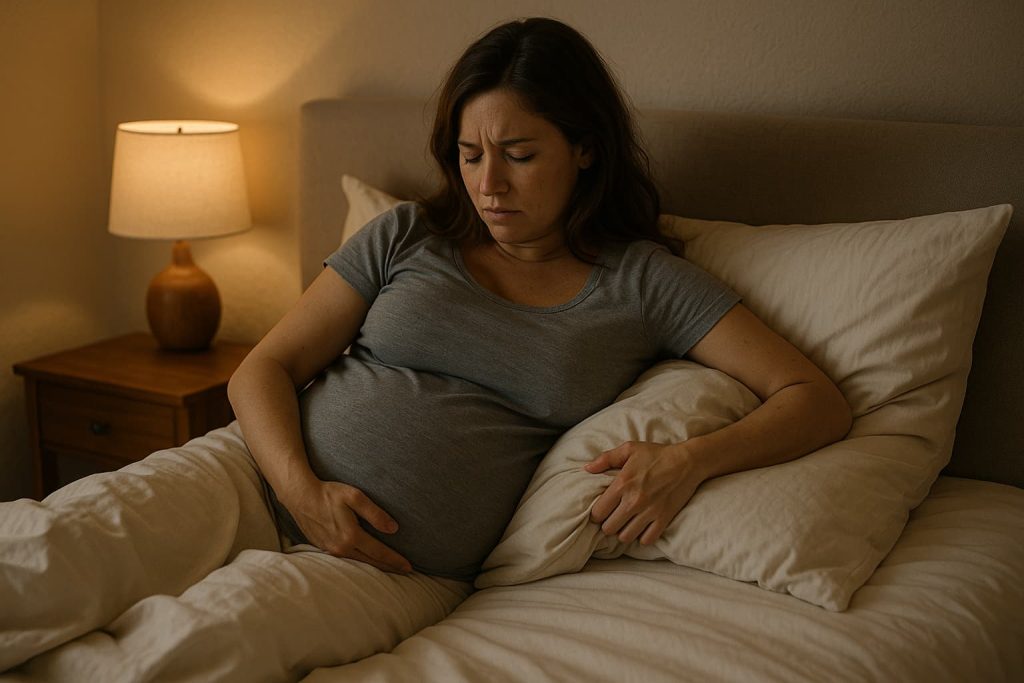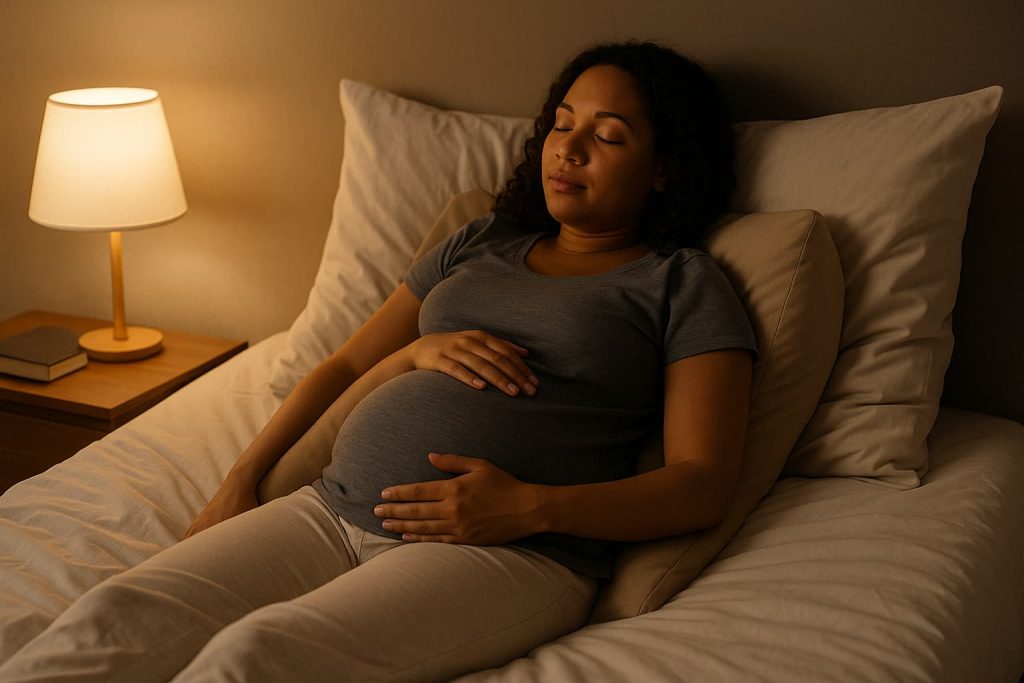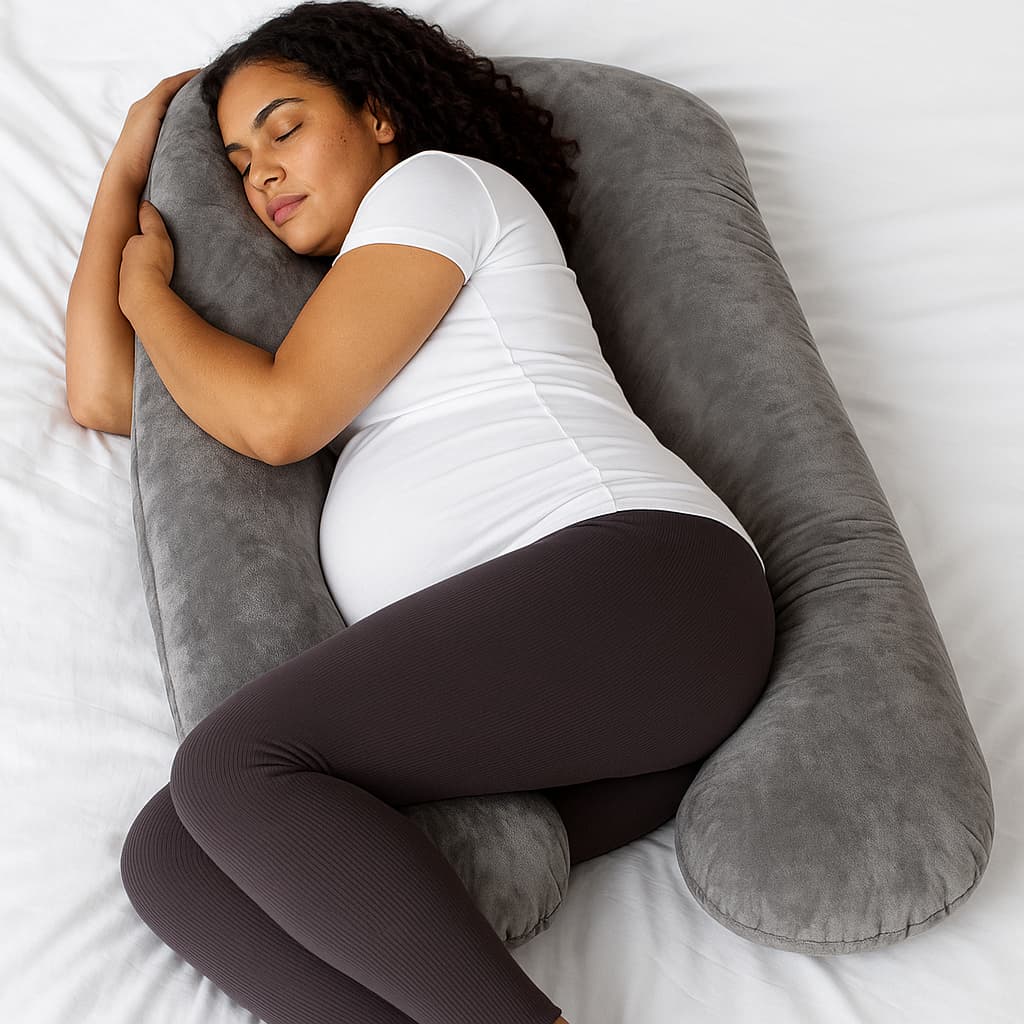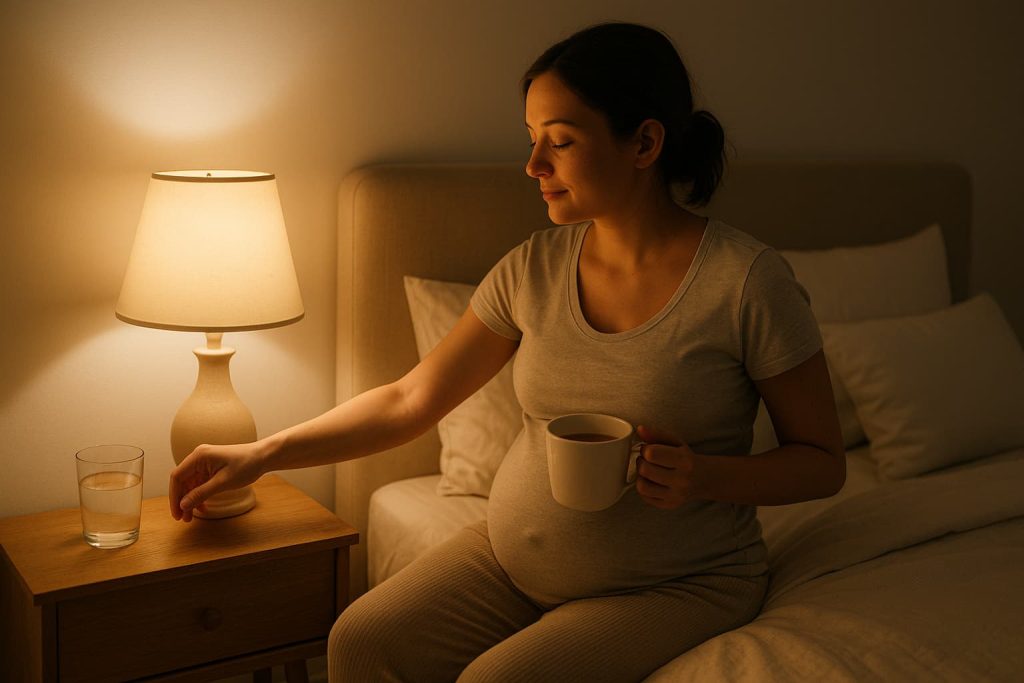Sleep can feel surprisingly tricky during pregnancy. One night you’re tossing, the next you’re too warm, and sometimes your mind just won’t settle. If you’ve been struggling, you’re not alone — most women notice their sleep shift as their body changes. The good news? A few simple adjustments can make nights feel more comfortable and restful, even during the tougher weeks.
In this guide, we’ll walk through sleep tips for pregnant women that are easy to follow, calming, and actually doable — no complicated routines or medical jargon. Just small, gentle changes that help your body relax and your mind unwind, so bedtime feels a little easier and a lot more peaceful.
Why Sleep Gets Hard During Pregnancy

Sleep can change for many reasons during pregnancy, and most of them are completely normal. Your body is working hard, your hormones are shifting, and even the way you breathe and move at night can feel different. As your belly grows, you might notice more pressure on your back or hips, or find that your usual sleeping positions don’t feel quite right anymore.
On top of the physical changes, there are little things that add up — more nighttime bathroom trips, extra warmth in your body, heartburn that shows up at the worst times, or a mind that stays busy long after you’re ready to rest. None of this means you’re doing anything wrong; it simply means your body is adjusting.
You don’t need to memorize every reason or feel stressed about them. What matters most is knowing that these sleep challenges have real causes — and with a few simple, supportive changes, you can create more comfort and calm as your pregnancy progresses.
Best Sleeping Positions During Pregnancy
Finding a comfortable position can feel like a nightly challenge when your body is changing so quickly. The goal isn’t to force yourself into one “perfect” posture — it’s to find positions that give you support, ease pressure, and help your body relax naturally. Here are the three positions that tend to work best during pregnancy, each offering different kinds of comfort.
1. Side Sleeping (Especially the Left Side)

Side sleeping is the most widely recommended option because it improves circulation and reduces pressure on your back. Sleeping on your left side can be especially supportive, but either side is fine. If your hips or lower back feel sore, place a pillow between your knees and another under your belly for extra comfort.
This position helps your body relax into the mattress without feeling strained.
2. Semi-Reclined Position

If heartburn or shortness of breath makes lying flat uncomfortable, a semi-reclined position can feel incredibly soothing. Use a wedge pillow or stack a few pillows behind you to create a gentle incline.
This slight upright angle helps reduce pressure on your diaphragm and keeps acid reflux from creeping up at night, making it easier to breathe and settle down.
3. Side-Lying with Full Body Support (Using a Pregnancy Pillow)

For many women, the most comfortable position is a side-lying posture supported by a C- or U-shaped pregnancy pillow. These pillows cradle your back, belly, and legs all at once, reducing the need to constantly readjust.
It helps your body feel held and supported — especially as your belly grows and you need more stability.
Related Posts:
- Meditation for Sleep: A Simple Step-by-Step Guide
- 10 Healthy Sleep Habits for Deeper Rest and Enegy
- 7 Herbal Teas for Better Sleep and Stress Relief
Simple Ways to Sleep More Comfortably During Pregnancy

Getting comfortable at night can feel harder than it used to, especially when your body is constantly shifting and growing. The goal isn’t to force yourself into a perfect routine — it’s to create small pockets of ease that help your body settle and your mind soften. These simple adjustments can make bedtime feel much more peaceful.
Make Your Body More Comfortable at Night
Before you even think about routines or wind-down habits, it helps to start with physical comfort. When your belly feels supported and your hips and back can relax, your whole body has a much easier time settling into sleep.
- Use extra pillows to support your belly, knees, and lower back
- Try a pregnancy pillow if you want full-body support
- Keep your bedroom cool to avoid nighttime overheating
- Choose soft, breathable sleepwear that doesn’t cling
- Do light stretching for your hips and lower back
- Take a warm shower to release muscle tension and calm your mind
These little adjustments can ease pressure, reduce tossing and turning, and help your body relax into the mattress naturally.
A Quick 5–10 Minute Pregnancy Bedtime Routine
Once your body feels supported, adding a short, calming routine can help signal to your brain that it’s time to slow down. You don’t need anything long or complicated — just a few soothing moments done consistently.
- Dim the lights to help your mind shift into “night mode”
- Practice slow, deep breathing for 30–60 seconds
- Play calming music or a short guided pregnancy meditation
- Sip a warm, caffeine-free tea that’s safe for pregnancy
- Put your phone away to reduce mental stimulation before bed
A simple routine like this can create a sense of safety and softness, making it easier for your body to drift into rest.
When to Talk to Your Doctor
Most sleep changes during pregnancy are normal, even if they feel frustrating or unfamiliar. But there are moments when checking in with your doctor can give you clarity, comfort, and the right support. You don’t need to wait for things to get “bad enough.” If something feels off, it’s always okay to ask.
Reach out to your healthcare provider if you notice things like:
- Ongoing, severe insomnia that makes daily life difficult
- Loud snoring paired with gasping or choking sensations
- Extreme swelling or sudden changes in blood pressure
- Chest discomfort or trouble breathing when lying down
A quick conversation can help rule out anything serious and give you peace of mind. You deserve to feel supported through every part of your pregnancy — sleep included.
You May Also Like :
- Magnesium for Better Sleep: When and How to Take It
- 6 Baby Sleep Tips : How to Help Your Newborn Sleep Better
- Best Bedroom Temperature for Deep, Restful Sleep
Bottom Line
Sleep can feel unpredictable during pregnancy, and some nights will naturally be easier than others. What matters most is giving yourself compassion and noticing the small things that help your body settle. A different pillow, a small routine, or a tiny shift in position can make more of a difference than you’d expect.
As your pregnancy changes, your sleep will ebb and flow too — and that’s okay. Try the tips that feel right for you, let go of the rest, and trust that your body is doing exactly what it needs to do. With a little patience and a few supportive habits, you can create nights that feel more comfortable, more restful, and a little more peaceful.
FAQs About Sleep During Pregnancy
How can I get better sleep while pregnant?
You can sleep better during pregnancy by using extra pillows for support, sleeping on your side, keeping your room cool, and creating a short, calming bedtime routine. Light stretching, a warm shower, and avoiding heavy meals before bed can also help your body relax and settle more easily at night.
Why can’t I sleep at night during pregnancy?
Difficulty sleeping during pregnancy is often caused by hormone changes, a growing belly, increased warmth, heartburn, and frequent bathroom trips. Stress or a busy mind can also make it harder to fall asleep. These changes are normal, and small comfort adjustments can make nights easier as your pregnancy progresses.
How much sleep does a pregnant woman need?
Most pregnant women need seven to nine hours of sleep each night, though your body may need more rest during the first and third trimesters. Fatigue is common as your body works harder, so naps and earlier bedtimes are completely normal if they help you feel more refreshed.
Why do I keep waking up at 3am while pregnant?
Waking up around 3 a.m. during pregnancy is common and can be caused by hormone shifts, increased bathroom trips, discomfort, or a restless mind. Light stretching, limiting fluids before bed, and a calming wind-down routine can help. Try not to worry — early-morning awakenings often improve over time.
Is it safe to sleep on my back during pregnancy?
Sleeping on your back is fine early in pregnancy, but later on it can put pressure on major blood vessels and make you feel lightheaded. If you wake up on your back, simply roll to your side without stress. Side sleeping, especially the left side, is usually the most comfortable and supportive.
What can I do for back and hip pain at night?
For back and hip pain during pregnancy, try sleeping on your side with a pillow between your knees and another under your belly. Adding support behind your back can also help. Warm showers, gentle stretching, and a supportive mattress surface can ease pressure and help your body settle more comfortably.

